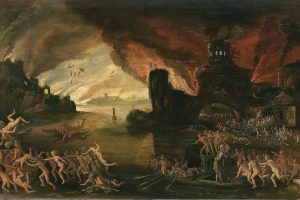At the heart of our faith is the Passion, death, and Resurrection of Jesus. We celebrate this mystery—this Paschal Mystery—every Sunday, in every Eucharist. Yet since the first century we have set aside one Sunday a year, in conjunction with the full moon of spring and the Jewish Passover, to celebrate the Paschal Mystery in a most solemn way.
On the eve of this “Easter Sunday,” at the Easter Vigil, we cooperate with God in a most holy work: giving birth, as spouse of Christ and Mother Church, to new life by celebrating Baptism, Confirmation, and Eucharist with those whom God has chosen.
This holy work, like the labor of childbirth, takes time. So by the second century, our annual Easter celebration grew from a one-day to a three-day celebration—the Paschal Triduum. And almost immediately, the three-day celebration gave rise to a 40-day period of intense, final preparation for Baptism beforehand (our Lent) and a 50-day period of contemplation and celebration afterward (our Easter season).
The mystery we celebrate on Easter Eve—the dying and rising of Christ as it is made present in the dying and rising of those who are baptized—is so profound that we need time to dwell in the experience, to savor it. The 50 days are the church’s maternity leave—a time to care for the new life that God has entrusted to us. It is the annual time for mystagogia—a Greek word meaning “to contemplate the mystery.” While joyously celebrating the Resurrection of Christ, we come to know ever more deeply what it means to be baptized, confirmed, and welcomed to the sacrificial, paschal banquet of Christ’s Body and Blood.
But why 50 days? First, because it’s 10 more than 40. Because God is so good, after 40 days of Lent spent in intense self-sacrifice and penance, in prayer, fasting, and almsgiving, God gives us 50 days of celebration, 10 more days of chocolate bunnies and jelly beans than ashes, bread, and water.
Second, the number 50 has a biblical, mystical significance. Think back to the first creation story in the Book of Genesis, which we read at the Easter Vigil, in fact. In creating the cosmos and ordering time, God gave us a seven-day week. So the number seven in the Bible represents the fullness of time, life lived to the fullest. Christ restores to us the fullness of life in God by suffering, dying, and rising from the dead. So our Easter celebration is seven weeks of seven days, or what our ancestors called “the week of weeks.”
Yet seven times seven is only 49. With God, there is always more! The number 50 is achieved by seven times seven plus one. Our Easter season is thus a promise and foretaste of eternity, of fullness of life that never ends, fullness times fullness plus one more for good measure.














Add comment